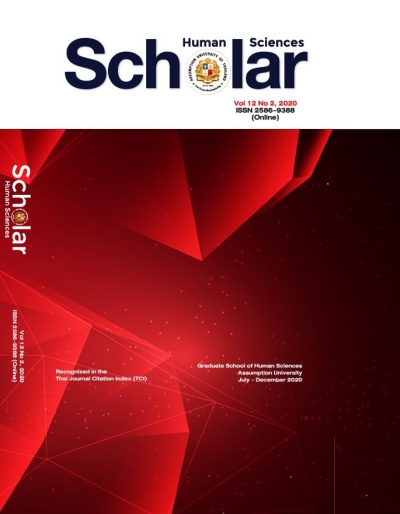A Comparative Study of High School Students’ Perception Towards School Environment According to Their Demographics at an International School in Bangkok
Keywords:
High School Students, Perception, School Environment, Demographics, International School in BangkokAbstract
This study mainly aimed to compare the high school students’ perceptions towards school environment according to their gender, nationality, grade and years of studying at an International School in Bangkok, Thailand. A total of 90 students from grade 10 to 12 got involved in this study. The adapted questionnaire based on Kate (2005) was used to students’ perception towards school environment of 6 indicators including health policies, physical environment, social environment, school-community relation, personal skill building, and access to health services at the selected international school. The collected data was analyzed statistically. The study found the overall level of high school students’ perceptions towards school environment at this international school were regarded as high, particularly, the highest perception was for Health Policies, and the lowest perception was for School-community Relations. No significant differences in the students’ perceptions towards school environment according to their gender and grade were identified, however, significant differences of the students’ perception towards school environment between Non-Thai students and Thai students; between the students studying at the international school of Bangkok for 1-3 years and 10 years and above were determined.References
Andrej, D. (2013) Perception Theories. Publisher: Towarzystwo Słowaków w Polsce ISBN: 978-83-7490-606-7
Bogler, R. (2001). The Influence of Leadership Style on Teacher Job Satisfaction, Educational Administration Quarterly, 37(37), 662-683.
Cerqueira, M. T., (1996) Health-Promoting Schools. World Health. The Magazine of the WHO, 49th Year, No. 4, July-August 1996
Deschenes, F. and Rowling, L. (2003). Comprehensive approaches to school health promotion: how to achieve broader implementation. Health Promotion International. 18(4): 387-396.
Downie, R.S., Fyfe, C., Tannahill, A. (1990). Health promotion: models and values.
Freeman, W. J. (1991). The physiology of perception. Scientific American, 264(2), 78-85.
Han, X. (2015). The Relationship between the Use Of Indirect Language Learning Strategies and Chinese Language
Achievement In Reading and Writing Among Students In Years 7 To 12 At Ascot International School In Bangkok, Thailand.
Master Degree Thesis, Assumption University Library, Thailand.
Hoffman, D.D. (2006). The scrambling theorem: A simple proof of the logical possibility of spectrum inversion. Consciousness and Cognition 15, 31–45.
Kate, A. L. (2005). Evaluating the Impact of the School Environment on Teachers’ Health and Job Commitment: Is the Health Promoting School a Healthier Workplace?
Meresman, S, D; Bundy, and Cerqueira, M.T. (2001) School Health: Policies, Programs, and Practice: Insights from Latin America. Partnership for School Health in Latin America and the Caribbean. Washington, DC: The World Bank/PAHO (Unpublished document)
Mary, S., B., Vivian, B., R., David, R. (1999). The European Network of Health Promoting Schools: Resource manual. Copenhagen: WHO Regional Office for Europe.
Robert, M. (2010) What Improvements Can be Made to the Academic Exercises for Social Studies: A study of the Academic Exercises Used for Studying Social Studies in English at Saint Joseph School Bangna. Master Degree Thesis, Assumption University Library, Thailand.
Ruilian, Z., (2017). A Comparative Study of Teachers’ Perception Towards School Environment According to Their Demographics at Zhaotong Experimental Primary School, Yunnan Province, China. Master Degree Thesis, Assumption University Library, Thailand.
Weila, O.Y (2016). The Relationship between Teacher’s Perception Towards Principal’s Leadership Behavior and School Climate in an International School of Thailand. Master Degree Thesis, Assumption University Library, Thailand.
World Health Organization (1997). Promoting Health through Schools. Report of a WHO Expert Committee on Comprehensive School Health Education and Promotion. WHO Technical Report Series 870. Geneva: WHO
Young, I., and Whitehead, M. (1993). Back to the future: our social history and its impact on health education. Health Education Journal 52 (3) 114-119.




